Agriculture Technology and Adoption Centre (AgTAC) Projects Reducing herbicides to improve our reef
Reducing herbicides to improve our reef
- Future Students
- JCU Global Experience
- International Students
- Open Day
- How to apply
- Pathways to university
- Virtual Open Day
- Living on Campus
- Courses
- Publications
- Scholarships
- Parents and Partners
- JCU Heroes Programs
- Aboriginal and Torres Strait Islander in Marine Science
- Elite Athletes
- Defence
- Current Students
- New students
- JCU Orientation
- LearnJCU
- Placements
- CEE
- Unicare Centre and Unicampus Kids
- Graduation
- Off-Campus Students
- JCU Job Ready
- Safety and Wellbeing
- JCU Prizes
- Professional Experience Placement
- Employability Edge
- Art of Academic Writing
- Art of Academic Editing
- Careers and Employability
- Student Equity and Wellbeing
- Career Ready Plan
- Careers at JCU
- Partners and Community
- JCU-CSIRO Partnership
- Alumni
- About JCU
- Reputation and Experience
- Chancellery
- Governance
- Celebrating 50 Years
- Academy
- Indigenous Engagement
- Education Division
- Graduate Research School
- Research and Teaching
- Research Division
- Research and Innovation Services
- CASE
- College of Business, Law and Governance
- College of Healthcare Sciences
- College of Medicine and Dentistry
- College of Science and Engineering
- CPHMVS
- Anthropological Laboratory for Tropical Audiovisual Research (ALTAR)
- Anton Breinl Research Centre
- Agriculture Technology and Adoption Centre (AgTAC)
- Advanced Analytical Centre
- AMHHEC
- Aquaculture Solutions
- AusAsian Mental Health Research Group
- ARCSTA
- Area 61
- Lions Marine Research Trust
- Australian Tropical Herbarium
- Australian Quantum & Classical Transport Physics Group
- Boating and Diving
- Clinical Psychedelic Research Lab
- Centre for Tropical Biosecurity
- Centre for Tropical Bioinformatics and Molecular Biology
- CITBA
- CMT
- Centre for Disaster Solutions
- CSTFA
- Cyclone Testing Station
- The Centre for Disaster Studies
- Daintree Rainforest Observatory
- Fletcherview
- JCU Eduquarium
- JCU Turtle Health Research
- Language and Culture Research Centre
- MARF
- Orpheus
- TESS
- JCU Ideas Lab
- TARL
- eResearch
- Indigenous Education and Research Centre
- Estate
- Work Health and Safety
- Staff
- Discover Nature at JCU
- Cyber Security Hub
- Association of Australian University Secretaries
- Services and Resources Division
- Environmental Research Complex [ERC]
- Foundation for Australian Literary Studies
- Gender Equity Action and Research
- Give to JCU
- Indigenous Legal Needs Project
- Inherent Requirements
- IsoTropics Geochemistry Lab
- IT Services
- JCU Webinars
- JCU Events
- JCU Motorsports
- JCU Sport
- Library
- Mabo Decision: 30 years on
- Marine Geophysics Laboratory
- Office of the Vice Chancellor and President
- Outstanding Alumni
- Pharmacy Full Scope
- Planning for your future
- Policy
- PAHL
- Queensland Research Centre for Peripheral Vascular Disease
- Rapid Assessment Unit
- RDIM
- Researcher Development Portal
- Roderick Centre for Australian Literature and Creative Writing
- Contextual Science for Tropical Coastal Ecosystems
- State of the Tropics
- Strategic Procurement
- Student profiles
- SWIRLnet
- TREAD
- TropEco for Staff and Students
- TQ Maths Hub
- TUDLab
- VAVS Home
- WHOCC for Vector-borne & NTDs
- Media
- Copyright and Terms of Use
- Australian Institute of Tropical Health & Medicine
- Pay review
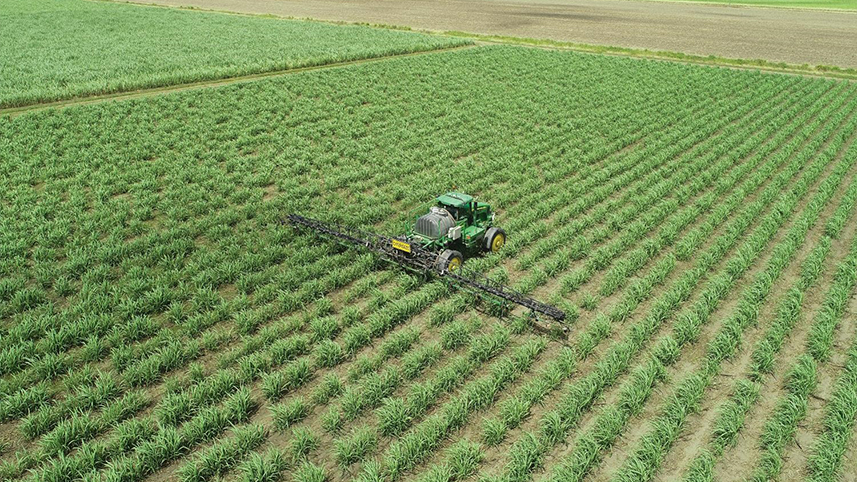
13-row self-propelled sprayer on a Burdekin sugarcane paddock, photo courtesy of AutoWeed's Alex Olsen
Using the latest advancements in artificial intelligence, computer vision and robotics, Mostafa Rahimi Azghadi and his team, in collaboration with industry partner, AutoWeed, Sugar Research Australia, and Department of Agriculture and Fisheries Queensland, are aiming to improve water quality in reef catchments.
Associate Professor Mostafa Rahimi Azghadi
“Our technology benefits both the environment and the industry: growers save resources and costs, while the environment and reef thrive with cleaner water from farms to tropical waterways and the reef.”
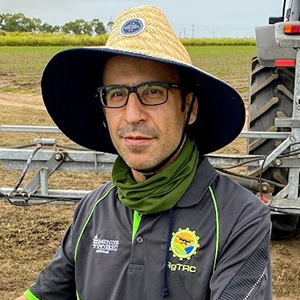
This innovative project has demonstrated significant water quality improvement. The AutoWeed smart spot spraying technology reduces the concentration of pesticide found in runoff, compared to the current blanket spray approach, while matching the same level of weed knockdown.
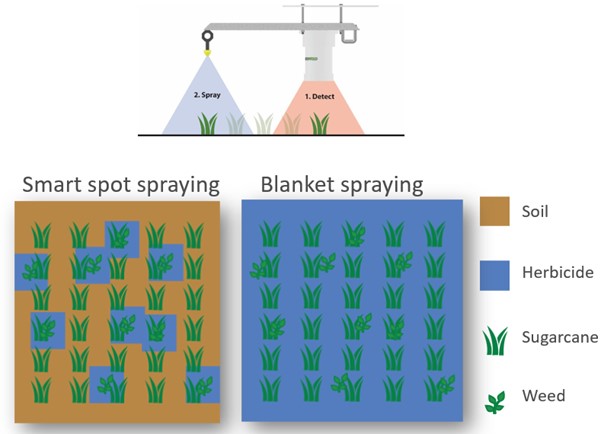
Smart spot spraying vs Blanket spraying
The project has completed 6 successful spray trials and has shown that on average robotic spot spraying on sugarcane farms is 97% as effective at weed knockdown while reducing herbicide usage by an average of 35% across all trials, compared to the industry practice of blanket spraying. In the best case, where weed pressure was lower, spot spraying was found to reduce herbicide usage by up to 75%. This includes specific trials on nutgrass in ratoon cane, nutgrass in plant cane, grass weeds in a beans crop and broadleaf weeds in a beans crop. Furthermore, strip replicated end-of-row water quality assessments showed that spot spraying reduced the mean concentration and mean loads of herbicides detected in runoff by an average of 61% and 46%, respectively, compared to blanket spraying. These results also confirm that herbicide concentrations and loads in runoff are directly proportional to the amount of herbicide sprayed. This reveals the significant potential of smart spot spraying to provide a step change in reef water quality if used at scale.
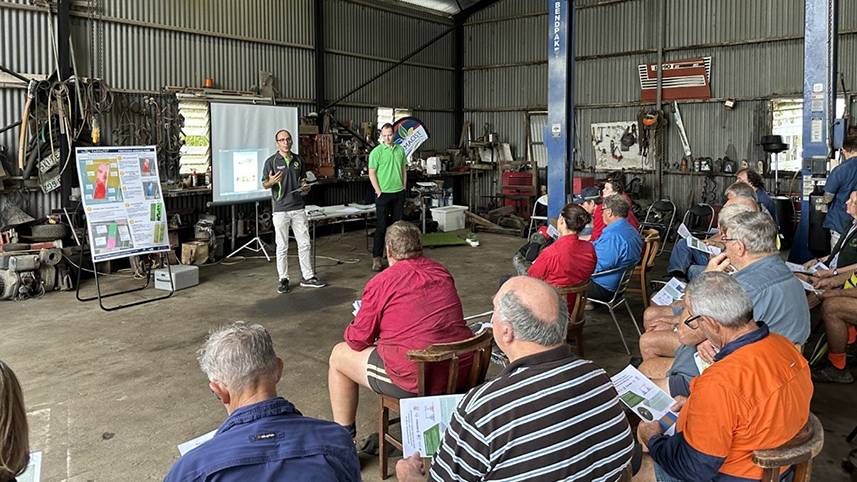
Mostafa Rahimi Azghadi and Alex Olsen, presenting their project results to the Mulgrave Russel growers Water Quality forum in Mirriwini
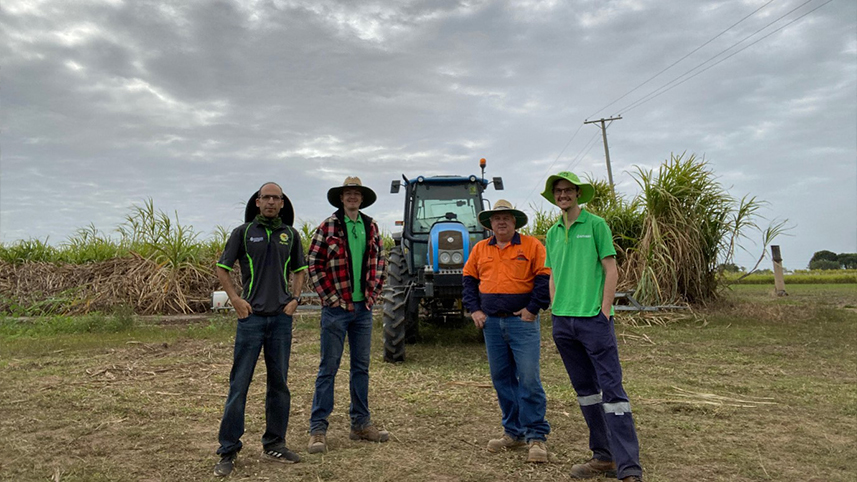
Auto-weed spray trial team in the Burdekin
A long-term objective of the project is to facilitate wide-scale adoption of the AutoWeed technology for sugarcane weed management. The existing proof-of-concept project has demonstrated that wide-scale uptake can result in a step decrease in the herbicide usage across the sugarcane industry, leading to improved water quality for the environment and the Great Barrier Reef (GBR).
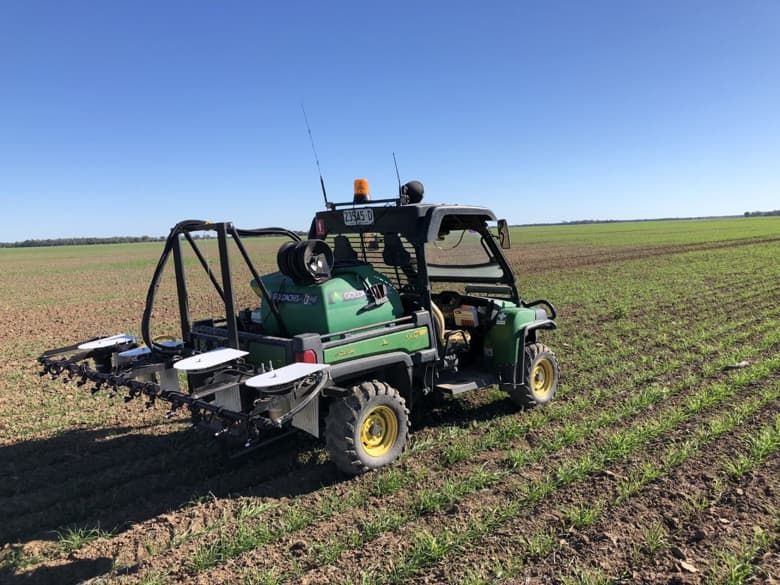
JCU Auto-weed machine
To achieve this long-term objective, Mostafa and the team are currently
(i) extending the spray trial work to more weed species across the Burdekin region and dataset collection to the Mackay/Whitsundays and Wet Tropics regions,
(ii) improving the AutoWeed technology with valuable new features (such as lighting, dual herbicide spraying and selective pre-emergent application) based on the requirements of the growers, and
(iii) providing a clear economic analysis of the use of the AutoWeed technology, showing the growers the financial and environmental benefits they can achieve in the long-term, should they adopt the AutoWeed technology.
This $900K collaborative project between James Cook University, AutoWeed Pty Ltd, Sugar Research Australia, and Queensland Department of Agriculture and Fisheries is operating between 2020 and 2024.
This project is funded by the partnership between the Australian Government’s Reef Trust and the Great Barrier Reef Foundation.
Contact details
Associate Professor Mostafa Rahimi Azghadi
Electrical and Electronic Engineering
mostafa.rahimiazghadi@jcu.edu.au
+61 7 4781 4349
